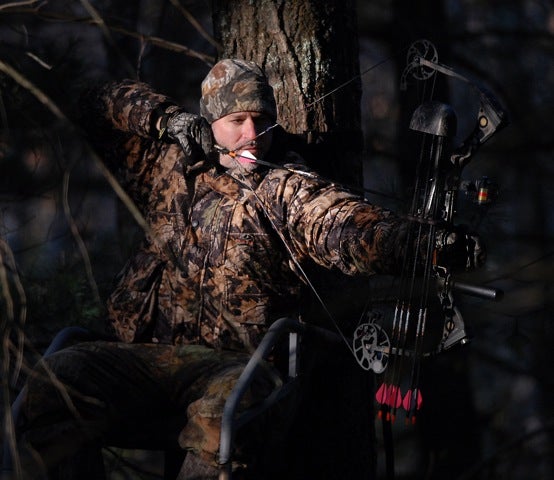Author: Cynthia E. Field
“I harvested three early-season deer two years ago and each had over 200 ticks,” recalled Drew Colby who, like several dozen other Abatement Specialists, hunts on the more than 100 private properties served by MassDeerService, Inc. of Waltham, Massachusetts (1-855-NO-DEER1).
Colby’s math is irrefutable: Each female deer tick can lay more than 1500 eggs after a blood meal. “That’s a lot of ticks [we hunters] remove from the forest,” Colby emphasized.
MassDeerService – a free opportunity offered to help homeowners and municipalities control deer overpopulation – is the brainchild of former healthcare industry professional Daniel S. Wolff, a suburban deer expert, TickEncounter Prevention Partner (TEPP), and creator of the TickEase™ tool for people and pets.
Paradoxically, Wolff admits, “I was not an outdoors person growing up in Wellesley, Massachusetts.” Wolff discovered a “natural aptitude” for hunting when, after college graduation, he moved to western New York where hunting is a popular pastime. Returning to the Boston area in the late 1980s, Wolff longed for “more time in the woods.”
“I guess timing is everything,” Wolff reminisced, “because in the early 1990s the deer population started to grow to levels not seen in the history of our State. I thought that eventually affluent private property owners in the suburbs of Boston would have problems because of the ‘nuisance factor.’ I began contacting residents in wealthy neighborhoods, asking them for permission to hunt deer on their properties. It worked! Several people in Dover, Massachusetts, expressed their dislike of deer due to the significant property damage they caused. That was 1992 and marked the birth of MassDeerService.”
Wolff’s company primarily serves landowners in Weston, Wayland, Lincoln, Dover, Sherborn, Medfield, Concord, Carlisle, Harvard, Dunstable, Framingham, Stow, Norfolk, and Hingham, but Wolff hopes to expand the service to other locales in eastern Massachusetts.
Since 1992 Wolff and his Abatement Specialists – all of whom pass criminal background checks, adhere to a written code of ethics, and demonstrate exemplary hunting skills – have witnessed an evolution in homeowners’ concerns. The men (there are no female Abatement Specialists yet) hunt exclusively with bows. Each year they take approximately 50 deer which means a potential decrease of some 22 million deer tick larvae in the forests of western Massachusetts – thanks to Wolff and his team.

“What began for my landowners as a way to reduce property damage suddenly became a way to help with [reducing the number of] ticks. Lyme Disease was a huge factor [in the growth of MassDeerService],” Wolff emphasized.
How do kids feel about deer abatement? One homeowner’s young daughters easily set aside any squeamishness about a professional archer in their Medfield back yard because, says their father, “They felt like prisoners in their own home.”
“At first my daughters were uneasy about the idea of shooting deer but that was quickly overcome by their greater fear of being bitten by ticks,” explained Keith Diggans. “Having a lot of friends who had contracted Lyme Disease, the girls pretty much realized on their own that the deer were a health menace and they supported the idea of professional removal of the deer,” Diggans said.
Another issue Diggans cited was deer flies. He recalled how his daughters “were unable to go out and enjoy our pool or have friends over for fear of being attacked and bitten by deer flies. They also were disgusted by the presence of deer droppings everywhere.”
The Diggans family also lost over $5,000 worth of mature plantings in one year alone…because of deer.
“Dan is an impressive bow hunter,” Diggans continued. “He and his partners have removed multiple deer from our property every year dating back five years. He stops by before the beginning of the fall hunting season to discuss our observations of the deer activity in our area. He sets up his tree stands over the areas of the highest activity and returns when the bow season starts,” Diggans explained.
Besides protecting the family’s health, “Dan provides great venison steaks and ground venison,” Diggans added.
Colby, the Abatement Specialist, reiterated the fact that “Dan’s hunters are not trophy hunters killing animals only for their antlers. We’re not looking for trophies; we’re looking for table fare.”
Another benefit Colby cited is more cerebral. “Hunting gives one the time to reflect on one’s life while reveling in Mother Nature’s beauty. Most hunts end without seeing deer but begin the process of recharging one’s mental batteries,” he said.
Also, according to Colby, harvesting deer actually enhances the forest ecosystem in ways we might not instantly appreciate. “Hunters aren’t out to exterminate deer; to the contrary, we want healthy, vibrant populations. I saw the health of one forest degrade significantly over the course of just two years as the deer wiped out the entire forest understory,” he said.
“The lack of forest understory virtually dooms each and every animal that relies on the same to raise their young,” Colby explained. “The young have nowhere to hide from their predators. This forest also lost every wildflower. Even if deer didn’t spread ticks,” Colby observed, “their impact on the health of forests can be devastating. Indeed, my son has started hunting with me now,” he said.
Dan Wolff, the MassDeerService founder, explained that “Over the years I listened to countless stories about the horrors of Lyme [Disease]. It really made me seriously afraid of getting sick and therefore inspired me to learn as much as I could and help as many people as I can. Dr. Mather and TickEncounter are doing a fantastic job and I am excited and pleased to be a TEPP and a steward of the program,” Wolff added.

